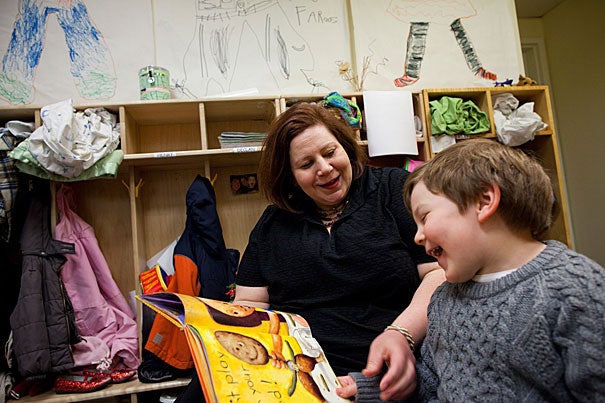
Lilia Halpern-Smith, assistant director for the Center for American Political Studies, is a working mother who taps Harvard’s child care opportunities. “I’m able to stop by for lunch or have a parent meeting and not have it take a huge chunk out of my day,” she said, noting that her office is just a few blocks from the center.
Stephanie Mitchell/Harvard Staff Photographer
Help on the home front
Harvard programs help workers to bridge gaps in family care
“It’s important to understand the role child care plays in supporting Harvard’s mission,” said Sarah Bennett-Astesano, assistant director of the Office of Work/Life. “When I get a phone call from a researcher who is, I don’t know, trying to cure cancer, and I can help that person secure reliable child care, it means she can get on with her work without having to worry about it. It lets us attract and maintain a more diverse work force.”
Bennett-Astesano’s words are echoed time and again by Harvard employees trying to juggle careers and families.
“Having so much support for child care makes it possible for a wider range of people to be here, or stay here,” said Ian Stokes-Rees, a research associate in biological chemistry and molecular pharmacology at Harvard Medical School (HMS) and the father of 3- and 6-year-old daughters. “How are we going to have future scientists if our current scientists are denied the opportunity to have children because they can’t afford it? How can we bridge that gap between scientists and the rest of the community, when becoming a top-rated scientist excludes having kids?”
Stokes-Rees and his wife, an anthropology postdoctoral scholar at Brown University, moved here from France a few years ago, and quickly learned that every penny of their higher salaries would be necessary in the United States. Massachusetts is the most expensive state for child care, according to a recent Boston Globe article, with an average yearly cost of $25,272. And that, as the writer pointed out, is just the average.
“Our child-care expenses are something like $40,000 a year,” said Laura Anne Lowery, a research fellow in cell biology at the Van Vactor Lab who is the mother of a 4-year-old and a 1-year-old. “So the $1,000 we get from our Harvard scholarship isn’t huge, but it gives us a little more money for other things.”
The scholarship she is talking about is just one of several ways in which the University is working to help its working parents. Scholarships are administered by employee group — ladder faculty, nontenure track faculty, and administrative and professional — and are means-tested. They pay for day care and after-school care for children ages 6 to 13, and, though each individual family might get only a few thousand dollars, the total cost for the University is about $3 million annually.
Most parents in the University community know about the six independently operated child-care centers that serve about 400 children, 90 percent of whom are Harvard-affiliated. Having her 4-year-old son in the Radcliffe Child Care Center on DeWolfe Street makes her work life “a lot easier,” said Lilia Halpern-Smith, assistant director of the Center for American Political Studies. “I’m able to stop by for lunch or have a parent meeting and not have it take a huge chunk out of my day,” she said, noting that her office is just a few blocks from the center.
Other popular programs focus on “gap care,” or times when parents need help outside their regular childcare routine. The first type involves the school vacation camps provided on the Cambridge, Longwood, and Business School campuses in February, April, and August, when public schools are closed but Harvard is not. “Each one has a theme,” said Bennett-Astesano. “One year it was Olympics, another it was space exploration.” The camps are inexpensive compared with community programs, at roughly $40 a day.
The second gap-care program is provided through a contract with the private agency Parents in a Pinch. It allows most Harvard-affiliated parents to call for an emergency caregiver and pay just $15 an hour, without having to worry about administrative fees that can add up to something like $65 a day. “It could cover a snow day, a day when your nanny is sick, when you have to work at a time you don’t usually have to,” said Bennett-Astesano. It can also be used for adult or elder care. “It should really be called People in a Pinch,” she said.
Finally, there’s Just in Time Care, where the University reimburses those who earn less than $70,000 a year up to $350 a year in expenses paid out of pocket for backup or emergency care.
Signing up for the programs is easy. “I just had to go on the Harvie website,” said Jaime McAllister-Grande, manager of user services and direct access processing at the Harvard College Library. “I didn’t have to ask anyone, make an appointment with HR, or anything. It was so easy to access, and it was all spelled out for you. In general, the child-care services here just make me feel supported, like they get that my life is not just work at Harvard, but also raising a child.”
On Feb. 3 at noon, HARVie will sponsor an online chat titled “Ladder Faculty Childcare Fund Winter Application Period.” Applications for ladder faculty with children under 6 years of age, who did not apply for a scholarship in the summer of 2010, will be accepted through Feb. 9. Applications are accessed through PeopleSoft. Ladder faculty and others who are responsible for disseminating information to ladder faculty are invited to join this chat with staff from the Office of Work/Life to learn more about the application process. You are encouraged to join this chat even if you’ve applied for a child care scholarship in the past, as the application process has moved to PeopleSoft this year. For more information, visit the HARVie website and click “Chats” in the left-hand column.




